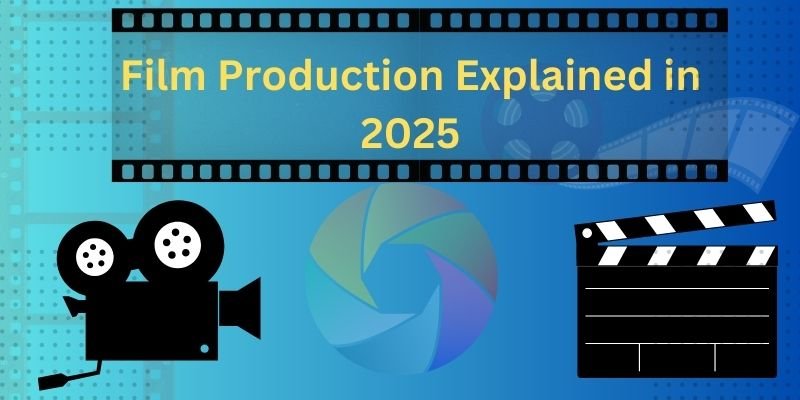What Is Film Production?
Fundamentally, the term “film production” describes the complete process of making a movie, from the original concept to the finished output. There are several steps involved, and each one calls for certain knowledge and abilities. Producing a film involves more than just shooting scenes; it involves coordinating other aspects, such as writing, directing, acting, editing, and more, to create an engaging narrative.
The making of films has a profound effect on society and culture. It inspires, informs, and amuses viewers everywhere. Whether it’s a big-budget Hollywood blockbuster or a tiny independent endeavor, every film production seeks to emotionally engage audiences.
The Stages of Film Production
Usually, there are five main steps involved in making a movie. Every step is necessary to guarantee a movie’s success.
1. Development Stage
The magic starts during the developing phase. It is the cornerstone of each successful motion picture. This is what occurs:
Idea Generation: Every movie project begins with a concept. This can be a factual tale, a book adaption, or an original idea.
Scriptwriting: The foundation of any motion filmmaking is the screenplay. To produce a compelling tale, screenwriters design the characters, language, and storyline.
Funding: Without funding, no movie can be made. Through crowdsourcing, production firms, or investors, producers obtain finance.
The mood of the entire filmmaking process is established at the development phase. It seems improbable that the project will thrive without a solid basis.
2. Pre-Production Stage
Preparation and planning are key components of pre-production. The film crew arranges everything required for shooting at this point. Important tasks include of:
Casting: It’s crucial to pick the best actors for each part. Any filmmaking may be elevated by excellent casting.
Location scouting: Selecting the ideal settings that fit the screenplay is essential to creating the ideal atmosphere.
Storyboarding: By graphically outlining each scene, storyboards make sure that all parties working on the movie are in agreement.
The finished film production blueprint is created during pre-production. The production process runs more smoothly with greater planning.
3. Production Stage
The core of making a movie is the production stage. At this point, the film begins to take shape as the cameras roll. This stage’s activities include:
Filming: To get the screenplay on camera, directors, cinematographers, and actors collaborate.
Lighting and Sound: For a film to be produced to a high standard, proper lighting and sound are essential. Teams make sure that every shot and conversation is flawless.
Overcoming Obstacles: Every movie production encounters unforeseen difficulties, such as bad weather or technological malfunctions. Solving problems quickly is essential.
Execution and creativity collide throughout the manufacturing phase. It is the aspect of the Film Production process that is most evident.
4. Post-Production Stage
The process of turning unpolished video into a finished film is called post-production. It is an essential step in the making of a movie that includes:
Editing: To produce a coherent story, editors chop and organize sequences.
Visual Effects (VFX): VFX is used in contemporary filmmaking to give life to fictional environments and characters.
Sound Design: To increase the film’s emotional impact, voiceovers, sound effects, and music are added.
The last step before the movie is ready for viewing is post-production. It’s where the magic of making a movie really comes to life.
5. Distribution Stage
Without distribution, no filmmaking is complete. This phase guarantees that the movie reaches its viewers by:
Marketing: The movie generates attention with social media marketing, posters, and trailers.
Film Festivals: In order to draw distributors and garner fame, many films have their premieres in festivals.
Streaming Platforms: In the era of digitalization, movie production and distribution have been transformed by sites like Netflix and Amazon.
The link between the audience and the producers is distribution. It’s an essential phase in the making of a movie.
Challenges in Film Production
The process of making a movie is both thrilling and difficult. Typical challenges include the following:
1. Funding Restrictions: One of the most difficult aspects of Film Production is handling money. Costs may rise rapidly, particularly for large-scale projects.
2. Time management: The entire filmmaking process might be thrown off if shooting schedules are delayed.
3. Technological Issues: As a result of technological advancements, filmmaking teams are always having to adjust to new tools and methods.
4. Creative Disagreements: While teamwork is essential in the filmmaking process, creative disputes can occur.
It takes perseverance, collaboration, and a problem-solving mentality to overcome these obstacles.
The Role of Technology in Film Production
Filmmaking has been transformed by technology in a multitude of ways:
Digital Cameras: At a fraction of the price, modern cameras provide high-quality video.
VFX & CGI: In filmmaking, visual effects have increased the storytelling potential.
Editing Software: Post-production is streamlined by programs like Adobe Premiere and Final Cut Pro.
Drones: Adding a new dimension to filmmaking, drones offer breathtaking overhead images.
To be competitive in the rapidly changing filmmaking industry, one must embrace technology.
Tips for Aspiring Film Production
Here are some pointers to get you started if you want to make movies:
1. Learn the Fundamentals: Recognize the roles and phases of film production.
2. Start Small: To get experience and develop your portfolio, start with short films.
3. Network: To gain knowledge and develop, make connections with industry experts.
4. Remain Current: Stay abreast of the most recent developments in Film Production technology and trends.
5. Have Perseverance: Although filmmaking is a difficult profession, success may be attained with perseverance and dedication.
The Future of Film Production
With developments in narrative methods and technology, the future of Film Production is bright. This is what to anticipate:
Virtual reality (VR): By producing immersive experiences, VR has the potential to completely transform the Film Production process.
Sustainability: filmmaking is increasingly prioritizing environmentally sustainable methods.
Diverse Voices: The industry is emphasizing diversity by providing a forum for a range of creators and stories.
filmmaking will keep developing, stretching the limits of imagination and ingenuity.
Conclusion
Film Production is an intriguing fusion of technology, creativity, and teamwork. It’s an adventure that starts with a straightforward concept and ends with a masterpiece of film. The ultimate product is greatly influenced by each step, from development to distribution.
Understanding film production improves your enjoyment of the art form, regardless of whether you’re an aspiring director or just a movie buff. You can better understand the effort and inventiveness required to make movies by delving into the intricacies of Film Production.
Making movies is a celebration of human narrative and imagination, not just amusement. Therefore, the next time you see a film, pause to acknowledge the amazing amount of work that went into making it. That is the Film Production power.
FAQs About Film Production
1. What are the main stages of film production?
The primary phases of making a movie are:
1. Development: coming up with concepts, crafting screenplays, and obtaining finance.
2. Pre-production: arranging the shoot, casting, and planning.
3. Production: The sequences are filmed.
4. Post-production: Adding effects, editing, and completing the movie.
5. Distribution: Making the movie available to viewers through festivals, streaming services, or cinemas.
2. How long does the film production process take?
The scale and complexity of the project determine how long a film takes to produce. While large-scale productions, including pre-production, filming, and post-production, might take several years, small films could just take a few months.
3. What equipment is essential for film production?
The following tools are necessary for film production:
cameras, whether digital or analog.
Lighting apparatus.
gadgets for recording audio.
editing programs.
Drones (for pictures from above).
The kind and scope of the film production determine which particular instruments are used.
4. What is the role of a producer in film production?
From ideation to ultimate distribution, a producer is in charge of the whole Film Production process. They acquire money, oversee the team, manage the budget, and make sure the project doesn’t go behind schedule.
5. How can someone start a career in film production?
To begin making movies as a career:
Take classes or study on your own to learn the fundamentals of Film Production.
Get experience by helping pros or working on modest tasks.
Create a portfolio that highlights your abilities.
Make connections in the field to locate openings.
Passion and perseverance are essential in this cutthroat industry.
For more Detail


One Reply on “467 views Film Production Explained in 2025”